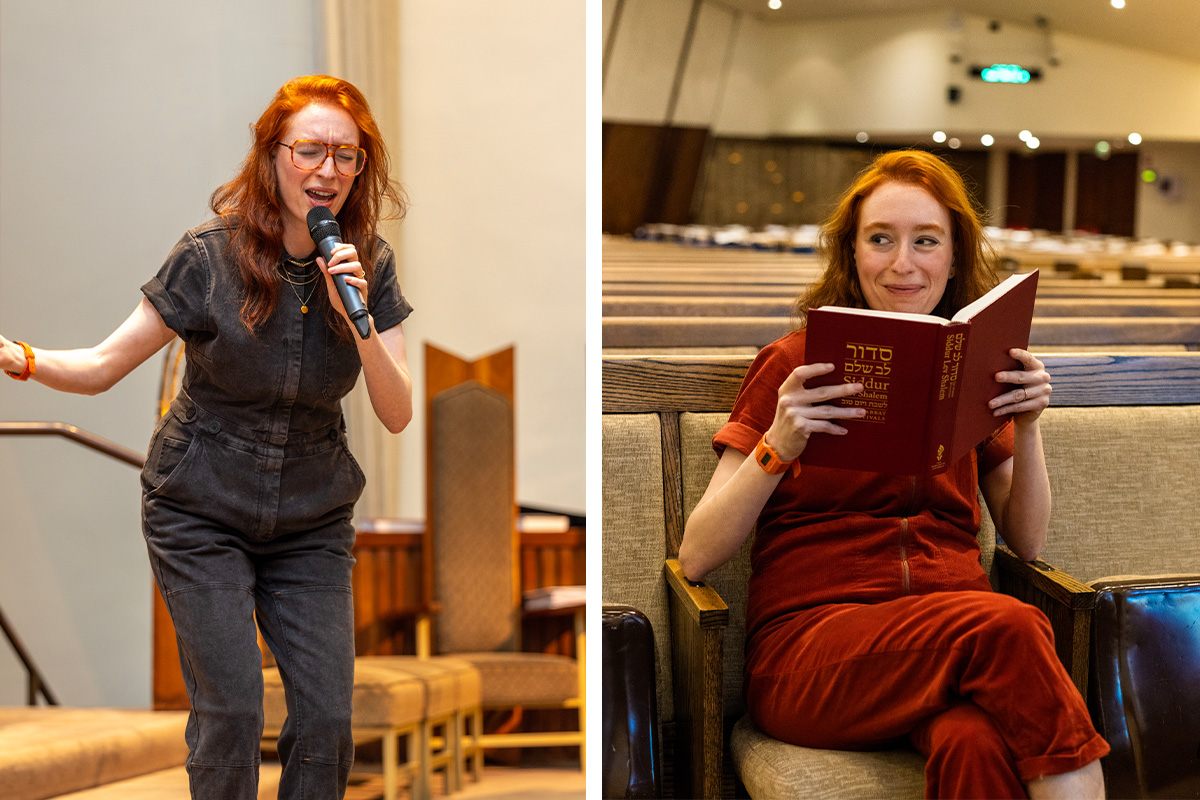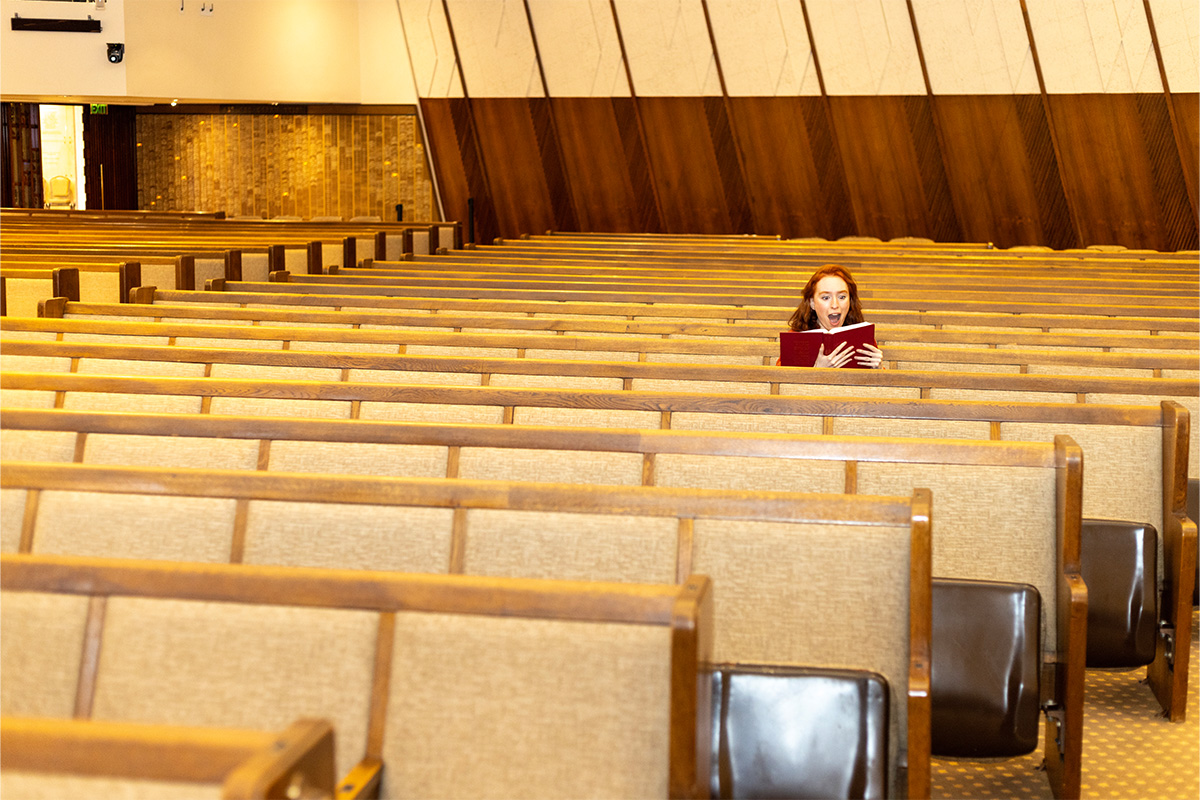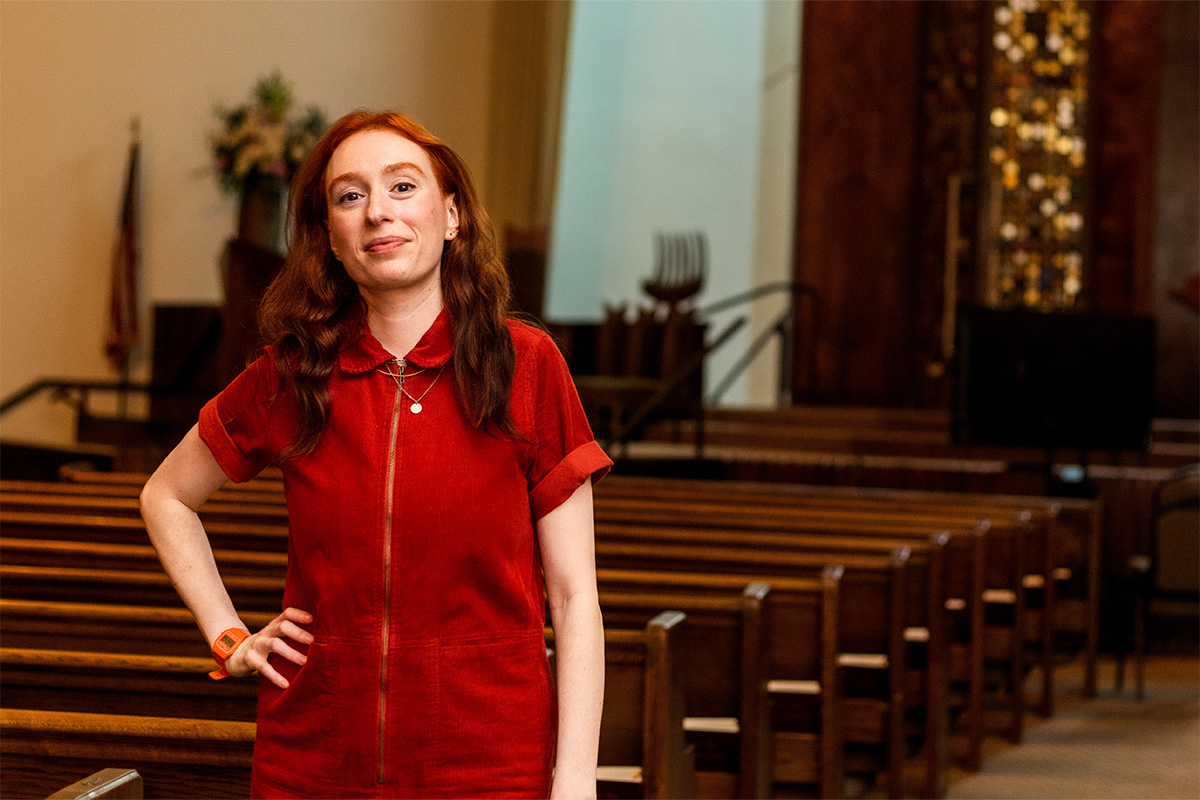If there was such a thing as The Best Jew, the title could very well go to Antonia Lassar. The L.A.-based comedian is deeply in touch with their Jewishness, hosting both a Jewy gossip podcast called “Yenta!” with fellow Jewish comic Raye Schiller and niggun circles for Hadar West Coast and IKAR. She describes herself as “a proud Jewish nerd writing comedy for other proud Jewish nerds” and the evidence is in her TikTok presence: Multiple of Antonia’s viral comedy videos have a Jewish angle, like the one about being a queer Jew and the one where she pretends to be the interior designer for every Reform synagogue.
So it just feels right that Antonia’s latest stand-up show is called “The Best Jew.” In the 70-minute show, Antonia charmingly turns the trope of youth pastor or rabbi trying to be funny and cool on its head; instead, they’re a rabbi-like comedian. They begin “Best Jew” by leading a rendition of “Hinei Ma Tov,” which leads into jokes about Judaism that are more than just surface-level references. Antonia lovingly pokes fun at the Reform movement, which she grew up in, and particularly its penchant for the world “meaningful.” She tells hilarious anecdotes about regularly going to megachurches as a Jew and how the state of the American healthcare system is so bad that she had to seek help for a chronic illness from a dead rabbi. And, of course, Antonia includes material about singer-songwriter Debbie Friedman — asking whether Friedman was the Messiah and poignantly ending the show with 10 minutes of restorative singing, a practice she learned from Friedman as they both have/had chronic, undiagnosed neurological illnesses.
The whole performance is extremely funny, and — dare I say it — extremely meaningful.
Antonia sat down with Hey Alma via Zoom to talk about their show, making friends at megachurches and whether Debbie Friedman is indeed the Messiah.
This interview has been lightly edited and condensed for clarity.
So how did you get into comedy?
I started doing speech and debate in high school, which is kind of like competitive acting. I was really slaying in the humorous categories, which gave me a clue that like, this is something I’m good at. But then I spent all of college thinking that I wasn’t funny, because I wasn’t good at improv. All the comedy around me was so male-dominated that I truly was like, “Well, I’m not a funny person. I just make jokes that people laugh at all the time. But I’m not one of those funny people.”
I also did solo theater for a long time, but I realized people don’t want to go to the theater — they’d much rather go to stand-up comedy. So I started billing myself as a comedian. [Then] I got into the sketch world at UCB. So all of that has added up to me obviously being a comedian, it just took me quite a few years to understand that that’s how everybody else saw me as well.
It’s interesting that was your path. Because dudes will be like, “I’m a stand-up comedian.” And it’s like, actually you just like to talk.
I know. And then they pause meaningfully and we feel forced to laugh.
Let’s talk about the word “meaningfully.” I grew up Reform, too. And I didn’t realize until watching your show how the word “meaningful” is really the crux of everything in the Reform movement.
I’ve kind of cursed myself with this show. Because now I have this radar for the word “meaningful.”
My partner and I do Zoom Shabbat every week — our synagogue is unaffiliated, but it’s kind of a mix of Reform and Reconstructionist — and now I want to make a drinking game out of how many times our rabbi says that word.
Oh, my God. Honestly, if my legacy was a drinking game for the word “meaningful,” I’d be like, “I’m done. I did it.”
Based on the show, it seems like we’ve had a similar experience, where you’re more observant and more informed about the intricacies of Judaism now than what you grew up with.
Yeah, so much. It’s like I say in the show, “If my 12-year-old self saw me now she’d be like, that’s not Reform that’s literally Hasidic.” I am living a Jewish life that is so different than my childhood self could have possibly imagined. I was in Hebrew school three days a week, I was dragged to so many Jewish activities. And, in my experience, there was no discussion of God or spirituality the entire time. I had no idea why I was being forced to do all of this. It was incredibly unpleasant. I didn’t really understand what the point of it was.
And then, in college, I stumbled into Evangelical Christianity, which was like, a life-changing experience. It was the first time I was around people who had a spiritual connection. And that was profound. That was the first place that I realized that you could have a legitimate divine, transcendent experience. In the church, I was very quickly aware that I was not interested in any of their ideology. But I was really moved by discovering that transcendence was possible. And then I came back to Judaism and discovered, hey, there are all these hippie Hasidic Jews who are all about transcendent spiritual connections.
You did the opposite of what the Christians were hoping. You took from them and then were like, “OK, I’m going to go be Jewish.”
And now they get to exploit me as someone who has a lot of Jewish knowledge, which they completely fetishize. So honestly, I think this is a win-win for both of us. They get to be friends with a Jew who knows a lot about Judaism. And I don’t have to be Christian.
You’re still in contact with people from the megachurch?
Yes. Every time I go to a new city, the first place I go to make friends is some kind of Orthodox religious institution — either Orthodox Judaism or evangelical Christianity. Because they are so good at making friends and building community. When you’re in a pinch and you need friends, they’re the people to go to. I moved to North Carolina during the pandemic and I went to this church. I walked right up to the pastor and I told him — this is verbatim what I said to him — “Look, I just moved to town. I don’t know anybody. I really need friends. And I’m wondering if you could introduce me to people. And then in exchange, you can try and convert me.”
That is so funny.
It was like the greatest experience of his entire life. He introduced me to all the youngest, coolest, hottest people to try and entice me to stay. They were incredibly cool and friendly. I’m legitimately friends with them.
That’s incredible. And as a performer that gives you a lot of material.
Totally.
So I assume you don’t still identify as Reform?
I really don’t know. The labels are really not speaking to me and I think this is common among a lot of Jews our age. Growing up, I would imagine that Reform means you don’t know anything, and you don’t do anything. And Orthodox means you know everything and you do everything. And that is just not true on either end. I will shift between many labels, if it’s helpful to give context to someone I’m talking to. But ultimately, none of them feel right. Unless I’m pitching myself to a Reform institution. Then I’m the most Reform Jew in the entire world.

You say this in the show, but the singing in the Reform Movement is amazing and I love how much singing you incorporate into the show.
Yes. First of all, we like to use instruments, which is a big improvement. And we don’t have to say all of the blessings and prayers in order. We’re allowed to loop back on words we’ve already said which really opens up the songwriting potential. We can mix up our words, we can throw in English, we can retranslate every “melech” to be “ruach.” That’s a move we love. We can go back to the refrain over and over. We’ve got a lot of musical options.
I didn’t realize in Orthodox Judaism you’re not supposed to repeat words.
If you’re singing a prayer or a blessing you’ve got to go all the way through it from beginning to end. Like I say in my show, the reason I think that Debbie Friedman‘s “Havdalah” melody blew up so much in the Orthodox world is because it’s one of her few songs that actually sings the entire blessing all the way through.
I also had no idea that Debbie Friedman’s “Havdalah” was so wide-ranging and has even made its way into the Orthodox world. Like… Do they know they’re singing a song written by a lesbian?
I mean I called up an Orthodox friend of mine and was like, “Do you know how Debbie Friedman’s ‘Havdalah’ melody became the standard ‘Havdalah’ melody?” And she was like, “Which Debbie Friedman? Does she live in Crown Heights?”
In the show you joke that Debbie Friedman is Moshiach. I have to ask: Is she?! I think, yes.
Yeah, of course. What an icon. She’s a good Moshiach because she had a very complicated personal life. We love our heroes to have a skeleton in the closet or two. And I mean, she was a hot lesbian singer-songwriter. Every great rabbi has been a singer-songwriter: the Baal Shem Tov, who started Hasidic Judaism, the Alter Rebbe, David, you know, the David. He was a songwriter.
I had no idea.
Oh yeah, it’s like a big thing. I mean, the real argument against Jesus is: Where are the songs? Where are the melodies?
So what I’m hearing is that we should be putting up Debbie Friedman stickers all over Crown Heights.
All over Crown Heights!
And get like a mitzvah tank with Debbie’s face on it.
Oh my God, and when you go inside you hear like “I am a latke, I’m a latke.”
Yes, and everyone gets a timbrel.
Yes. The original title of this show, but it was too niche, was “The Debbie Friedman of Stand-Up Comedy.”

Oh, I love that. OK, that leads into my next question: Why does so much of your comedy center around Jewishness?
It’s a question I asked myself as well. I think there are a couple of reasons. One is that, as a comedian, the best comedy you write is about what you know and I am just so immersed in Jewish life. I go to synagogue regularly. I’m hosting singing circles. I’m so freaking Jewy. It would be crazy not to write about it.
Another reason is because I think that there is a weird lack of comedy for Jews. There are so many Jewish comedians and so few of them are making something specifically for Jews. It means that so much of our comedy is based on these really overdone bits: bagels, IBS, overbearing mothers. I feel a responsibility to move us so much deeper than that.
And then another reason that I’m doing a lot of Jewish comedy is honestly because there’s a big market for it. It really started snowballing for me over the pandemic. I got on TikTok and thought that I was going to become the next big chronic illness influencer. And then the algorithm only boosted my videos with Jewish content for some reason. I thought “I’ll ride this out” and started leaning into making Jewish content. I suddenly started having all of these rabbis in my DMs being like, “Will you perform stand-up for my synagogue?” And that was the start of the show. Because I told all of them, “Yes, absolutely. I just have to write it.” And then I spent a year trying to figure out what I wanted to tell synagogues. And now I have the show. So there’s a huge interest in comedy by Jews for Jews. And I’m so thrilled to be deepening the catalog of what we make jokes about.
Even though I love “The Debbie Friedman of Stand Up Comedy,” “The Best Jew” is still a great title for a show. Jews, especially in this moment, love to call each other bad Jews or not even Jews. You rarely see someone being like, “You’re the best Jew.” It’s a really refreshing change of pace.
I’m nothing if not confident. And you’re so right, there is not a single Jew in the world who’s like, “I’m Jewish enough.” Every single one of us feels inferior to some real or imagined Jew who’s doing it better, who’s more observant, who’s more learned, who does more social justice work.
Who finds more Judaism more meaningful.
I just want to lean into the fact that we’re never gonna hit it… But I’m probably the best Jew.
More Jews should have that mindset. OK, so something I also want to talk about is how we as Jews can be less sensitive about jokes about the Reform movement. Because I’m not really Reform anymore but I still am kind of sensitive when people joke about it!
I’m curious, did you feel sensitive about any of the jokes in the show?
Not particularly. It was just something I was thinking about because you lovingly tease Reform Judaism a lot in the show. Which is fun! But also being Reform, I grew up hearing a lot of opinions saying that Reform Judaism isn’t a valid Jewish practice.
I feel like whenever I’m in a Reform synagogue everybody is absolutely roasting Reform Judaism. And when I’m in an Orthodox synagogue, everyone is absolutely roasting Reform Judaism.
But we’re so good at making fun of ourselves. I am so deeply in the Reform tradition that I feel like it is both my right and responsibility to nit-pick us to shreds. I think I am not sensitive to it because I’m incredibly contrarian. So when I’m around Reform Jews who are saying Orthodox Jews are crazy, I’m like, “Well, you know, they have a lot to offer. Their practices are really beautiful.” And when I’m around Orthodox Jews who are talking shit about Reform Jews, I’m like, “You know, you should try a little more to tikkun olam. And Leonard Cohen really enhances the Rosh Hashanah service.”
It just feels very Jewish to talk shit about ourselves and also I’m doing it for crowds that are mostly Reform Jews. Though every so often I’ll have people from other denominations. And actually the feedback we’re getting from all kinds of Jews is like, “Oh my god, there was something in it that was perfect for me.”
How did you workshop the show? I imagine that was hard because you can’t always get a majority Jewish audience.
Workshopping this material was incredibly difficult because you really can’t do it in comedy clubs. I kept trying, and then I would have to explain the jokes so long that everyone would get so bored. I started just making up Jewish facts for non-Jewish audiences. So I ended up workshopping these bits a lot with the local Moishe Houses in Los Angeles. That was a really good community. And then I also worked pretty closely with my podcast partner, Raye Schiller. Raye is a Jewish comedy genius and we obsessively talk about whether our comedy is by Jews for Jews or by Jews for goys.
That really is the question for any sort of Jewish media. It’s harder to find entertainment that is both.
I think Alex Edelman’s show “Just For Us” is a great example. He walks the line.
Yeah, totally. But when something is mostly for non-Jews, it does make me raise my eyebrows a bit.
That’s also the majority of the Jewish content out there. I understand from a marketing perspective, why you’d want to have a bigger audience than just us. But I get so excited every time I see content that is really specifically tailored for Jews. Modi and Elon Gold are two comedians I can think of that are doing that in a big way.
Alex also told me that was important to him when writing Saturday Night Seder in 2020. He said he really didn’t want it to be anchored in stereotypes.
I read your interview! And I loved reading when he said “no bubbes, no briskets, no bagels.” I think that’s like the fundamental thesis of my Jewish comedy as well. It wasn’t always though. When I started making Jewish comedy I was working in those kinds of tired stereotypes. And once I started getting a big enough profile on the Jewish internet, I felt this enormous responsibility to actually know enough about Judaism that I could actually make fun of it.
Antonia Lassar will perform “The Best Jew” at Laugh Boston on April 24 and Congregation Bet Haverim in Atlanta on May 18.



